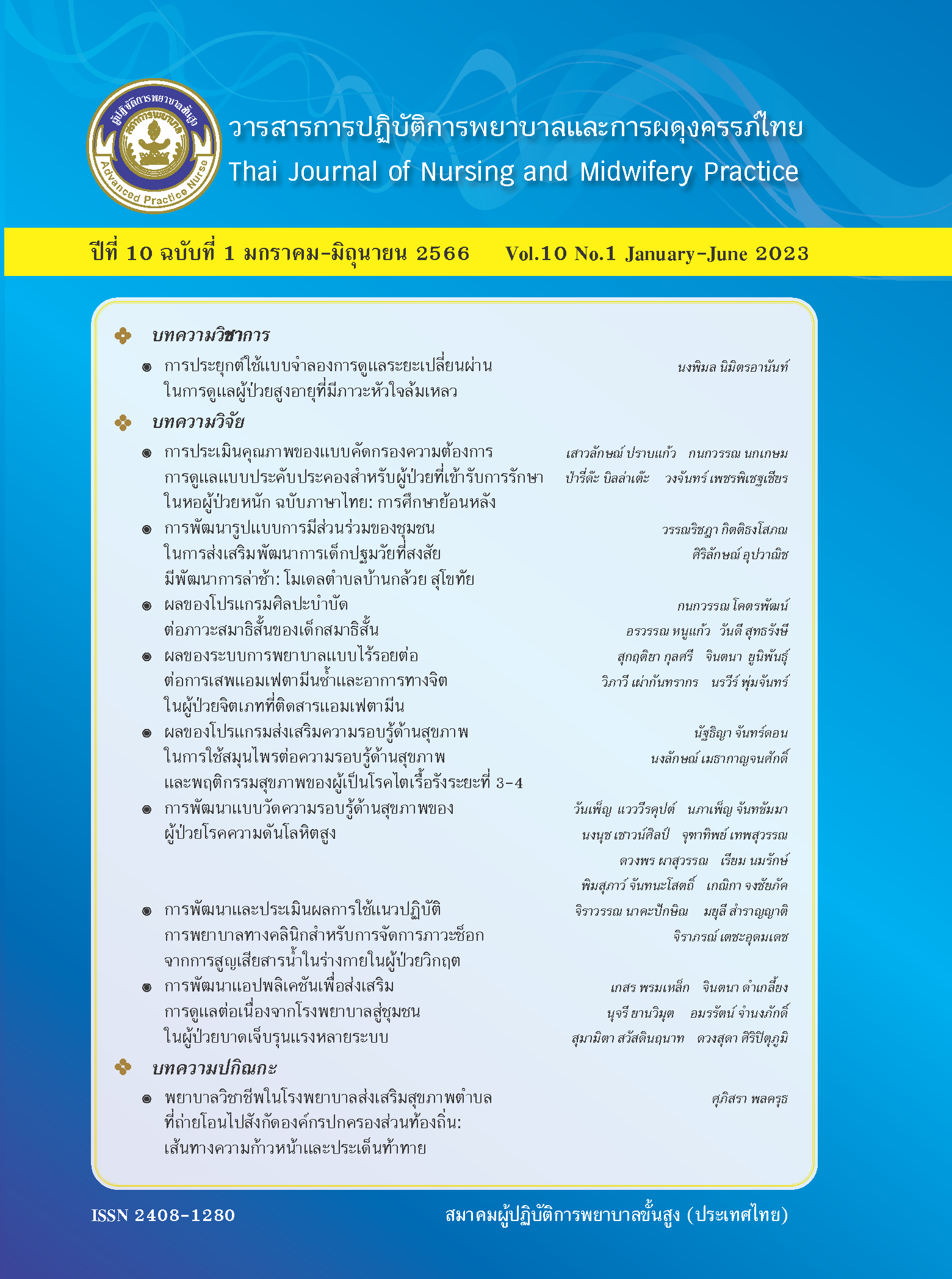Development of a Health Literacy Scale for Persons with Hypertension
Main Article Content
Abstract
This research and development aimed to 1) develop a health literacy scale for persons with hypertension, and 2) examine the quality of the health literacy scale with construct validity by using confirmatory factor analysis and by means of hypothesis testing. The participants were 400 persons with hypertension selected by multi-stage random sampling. Data were analyzed using descriptive statistics, Chi-square, and confirmatory factor analysis. Results showed that the health literacy scale for persons with hypertension comprised six components: 1) access to health information and health services, 2) communication about health, 3) appraisal and decision- making for practice, 4) self-management, 5) media and information literacy, and 6) knowledge and understanding of the hypertension disease. The content validity of the health literacy scale was between 0.80 – 1.00. The validity of the first five components was between 0.85 - 0.92 while the sixth component, knowledge and understanding of the hypertension disease scale had a reliability value of 0.78, discrimination between 0.44 – 0.92, and difficulty between 0.24 – 0.72. The results of the construct validity test using confirmatory component analysis showed that the scale was consistent with the empirical data with a Chi-square value of 324.23, df = 175, p-value < .001, and Root Mean Square Error of Approximation (RMSEA) = 0.05. Examination by hypothesis testing method showed that the overall score was at a good level except for the component in access to health information and health services which was at a poor level of 32.75 percent. This scale should be used to further assess the health literacy of persons with hypertension.
Downloads
Article Details

This work is licensed under a Creative Commons Attribution-NonCommercial-NoDerivatives 4.0 International License.
References
World Hypertension League (WHL). World hypertension day 2018, 2018. [cited 2021 September 5]. Available from: http://www.whleague.org/index.php/features/world-hypertension-day.
The International Society of Hypertension (ISH). Background information on high blood pressure (hypertension), 2017. [cited 2022 April 25]. Available from: https://ish-world.com/ish-global-hypertension-practice-guidelines/
Department of Disease Control, Ministry of Public Health. Pressure Day campaign issue world high blood pressure, 2022. [cited 2023 January 15]. Available from: http://www.thaincd.com/2016/mission/documents-detail.php?id=14220&tid=32&gid=1-020. (In Thai)
National Health Security Office (NHSO). NHSO Annual Report 2020, 2021. [cited 2022 April 25]. Available from: https://www.nhso.go.th/storage/downloads/operatingresult/47/F_NHSO_Annual_Report_2020.pdf. (In Thai)
Aekplakorn W, Puckcharern H, Satheannoppakao W. Report of the 6th Thai people's health survey by physical examination, 2019 - 2020. Graphic and design publishing house; 2021. (In Thai)
Roma W, Tanasugarn C, Tipayamongkholgul M, Aimyong N, Neelapaichit N, Kloyiam S, et al. Report of health literacy survey of Thai people aged 15 and over 2017 (Phase 1). Nonthaburi: Health Systems Research Institute; 2018. (In Thai)
Thongma P. Health Literacy and Health Outcomes in Hypertensive Patients. Thai Red Cross Nursing Journal. 2020; 13(1): 50-62. (In Thai)
Norasing M, Thanomphan S. Health literacy and health behavior in patients with uncontrolled blood sugar level or blood pressure: a case study of Nakornping Hospital, Chiang Mai Journal of Nakornping Hospital. 2019; 10(1): 36-50. (In Thai)
Nutbeam, D. The evolving concept of health literacy. Social Science & Medicine 2008; 67(12): 2072-2078.
Intarakamhang U, Khammungkul J, Boocha P. General health literacy scale for Thais and comparison between age groups. Heliyon 2022; 8(5):e09462.
Nakhon Pathom Provincial Public Health Office. Statistics of chronic disease patients registered for services of the Nakhon Pathom Provincial Public Health Office, the fiscal year 2022. Nakhon Pathom; 2022. (In Thai)
Yamane, T. Statistics: an introductory analysis.3rd Ed. New York. Harper and Row Publications 1973.
Nutbeam, D. Defining and measuring health literacy: what can we learn from literacy studies? Int. J Public Health 2009; 54: 303-305.
Hair, J.F., Black, W.C., Babin, B.J., & Anderson, R.E. (2010). Multivariate data analysis. 7th ed. New Jersey: Pearson Education.
Department of Health Service Support, Ministry of Public Health. Tools for promoting health literacy in health facilities. Nonthaburi; 2019. (In Thai)
Cronbach L J. Essentials of psychological testing. New York: Harper & Row; 1990.
Waelveerakup W., Pasuwan D., & Manalo R J C. Community–based teaching and learning management as the foster family in Thailand: PLESS+ OSCE Model. Interdisciplinary Research Review 2021; 16(6): 53-58.
Chitmanasak N, Jirawongnusorn S, Littisan S. Phooyadao P. The development of health literacy measurement for elderly accord to Thailand 4.0. Journal of Social Science and Buddhistic Anthropology 2021; 6(9): 381-395. (In Thai)
Ministry of Public Health. Health literacy and health behavior assessment report in the year 2017. [cited 2022 October 8]. Available from: http://www.hed.go.th/linkHed/321.


